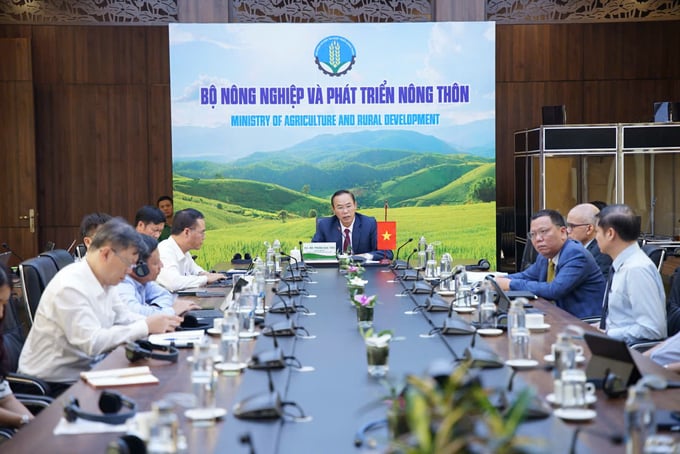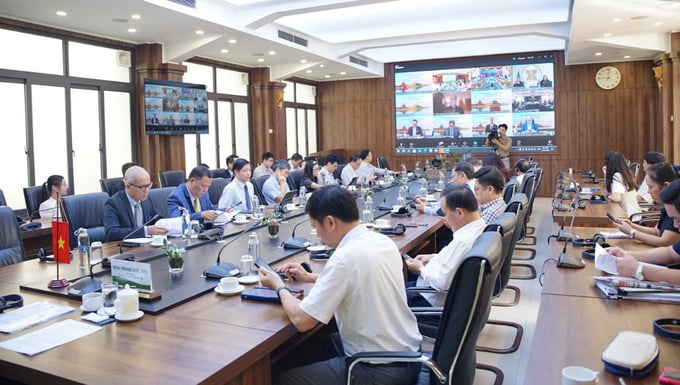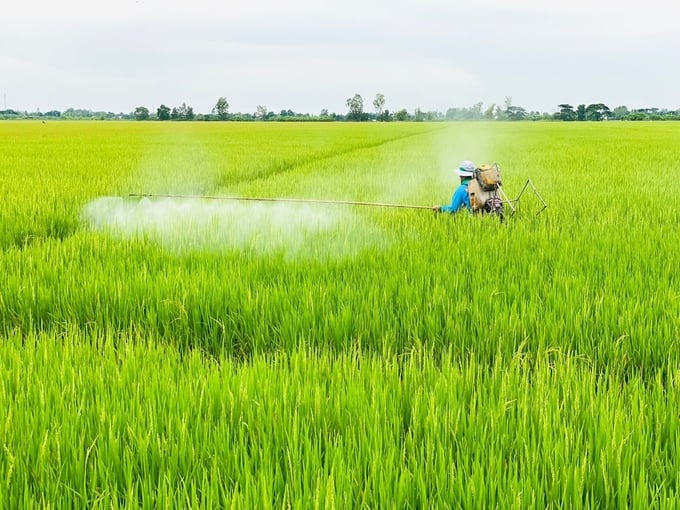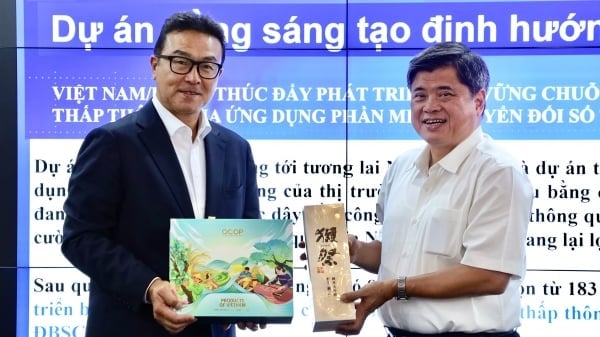May 25, 2025 | 04:29 GMT +7
May 25, 2025 | 04:29 GMT +7
Hotline: 0913.378.918
May 25, 2025 | 04:29 GMT +7
Hotline: 0913.378.918

Deputy Minister Phung Duc Tien attended the 46th ASEAN Ministers on Agriculture and Forestry (AMAF) online conference. Photo: Linh Linh.
Mr. Phung Duc Tien, the Deputy Minister of Agriculture and Rural Development, underscored the importance of the 46th ASEAN Ministers on Agriculture and Forestry meeting during the reporting session and recommendations from the Chair of the Special ASEAN Senior Officials Meeting on Agriculture and Forestry (SOM-AMAF). He stated that the meeting was a critical opportunity to review and summarize ASEAN's cooperation in food, agriculture, and forestry for the year 2024.
The proactive spirit and efforts of the ASEAN sectoral working groups and technical bodies under the framework of AMAF, as well as international partners and organizations, in finalizing and agreeing on numerous important documents on cultivation, livestock, veterinary, plant protection, fisheries, and forestry, which were presented for consideration at this ministerial meeting, are greatly appreciated by Vietnam.
The Deputy Minister shared that the food, agriculture, and forestry cooperation of ASEAN has been effectively implemented in 2024, resulting in significant outcomes that contribute to food security, sustainable agricultural development, and low emissions. Vietnam is actively and responsibly engaging in the food, agriculture, and forestry cooperation of ASEAN, thereby contributing to the collective accomplishments.
The 44th-45th ASEAN Summit, which took place in Laos in October 2024, adopted the Declaration on Promoting Sustainable Agriculture and recognized the Action Plan on Sustainable Agriculture in ASEAN. The adoption of this declaration will facilitate additional collaboration among ASEAN member states, the ASEAN Secretariat, partners, and international organizations in order to continue the implementation of ASEAN's Carbon Neutral Strategy. This initiative will also benefit farmers and protect the environment, while also contributing to food security and promoting sustainable and low-emission agricultural development in the ASEAN region.
Deputy Minister Phung Duc Tien underscored that Vietnam is committed to the objective of attaining net-zero emissions in agriculture by 2050 and places a high value on ASEAN's Carbon Neutral Strategy.
"We urge the FAO regional office for Asia-Pacific, as well as national offices, partners, and international organizations, to assume responsibility for the implementation of these strategies. Vietnam continues to endorse Malaysia's proposal to establish ASEAN's Vision for Agriculture by 2045, which is an economic priority task for Malaysia's ASEAN Chairmanship in 2025.
I believe that the food, agriculture, and forestry cooperation of ASEAN will generate new momentum and opportunities for sustainable and low-emission agricultural development, thereby guaranteeing food security for the entire ASEAN region," stressed the Deputy Minister.
At the 46th AMAF meeting, ASEAN reiterated its dedication to fostering collaboration in the fields of agriculture, forestry, and food.
The meeting acknowledged the significance of sustainable agriculture, forest management, carbon reduction, and digitalization in the ASEAN region. It urged all stakeholders, including academics, international organizations, and the private sector, to work with ASEAN member states through the ASEAN Secretariat to implement sustainable and circular food, agriculture, and forestry policies that have been approved by ASEAN.

Representatives from the Departments and units of the Ministry of Agriculture and Rural Development attended the online conference from the Ministry's headquarters. Photo: Linh Linh.
In order to confront urgent global and regional challenges, ASEAN's food, agriculture, and forestry policies emphasize circularity and sustainability from 2023 to 2024. The necessity to curb climate change, address resource scarcity, and preserve biodiversity is the impetus behind these initiatives. ASEAN's objective is to safeguard critical ecosystems by encouraging sustainable activities and the efficient utilization of resources, in addition to enhancing food security and generating economic opportunities.
The conference underscored the significance of resilience, innovation, and cooperation in the forestry, agriculture, and food industries.
ASEAN's specialized working groups were encouraged to persist in their efforts to implement critical initiatives related to food, agriculture, and forestry, as numerous priority areas for cooperation were identified for the upcoming years.
These initiatives encompass the following: the promotion of sustainable agriculture through the Action Plan on Agriculture; the reduction of crop residue burning in the region through the implementation of the ASEAN Guidelines on reducing crop residue burning; the cessation of crop residue burning and the reduction of the use of hazardous agricultural chemicals; the promotion of nature-based solutions through the implementation of the ASEAN Strategy for Sustainable Mangrove Ecosystem Management; and the combat of antimicrobial resistance (AMR) in livestock, aquaculture, and fisheries.
In addition, the promotion of the use of biological control agents (BCA) in agriculture, which includes cultivation, livestock, aquaculture, and fisheries; the sustainability of land and water resources for agricultural production; and the encouragement of the adoption of regenerative agriculture and digital technologies in food, agriculture, and forestry.
Vietnam is committed to the vision of attaining net-zero emissions in agriculture by 2050 and places a high value on the Carbon Neutral Strategy of ASEAN.

Vietnam supports the goal of achieving net-zero emissions in agriculture by 2050 and highly values ASEAN’s Carbon Neutral Strategy.
ASEAN member states are encouraged to align their initiatives with regional priorities in order to resolve these priority areas. The ASEAN Secretariat will collaborate with a variety of partners and provide support to ASEAN member states in order to expedite the implementation of these initiatives.
Not only does this collaborative strategy seek to resolve the urgent obstacles encountered by the ASEAN region, but it also seeks to foster long-term sustainability and resilience in critical sectors that are essential for economic growth and agricultural security.
The conference underscored the importance of fostering sustainable agriculture in the ASEAN region to safeguard biodiversity, ensure food security, and mitigate the effects of climate change. ASEAN, one of the most populous and diverse regions in the world, is confronted with substantial obstacles, including land degradation, water scarcity, and the growing demand for food. In addition to promoting ecological equilibrium and conserving valuable natural resources for future generations, the implementation of sustainable agricultural practices not only increases productivity and resilience within farming systems.
The conference consensus was that ASEAN member states can promote economic growth and environmental protection by investing in innovative technologies, sustainable land management, and eco-friendly practices, as well as by empowering farmers, improving rural livelihoods, and creating a healthier and more sustainable food and agriculture system.
Translated by Dieu Linh

(VAN) On May 23, Deputy Minister of Agriculture and Environment Tran Thanh Nam held a working session with a Japanese delegation on the application of digital technology in agricultural production.

(VAN) In the tranquil wetlands of Van Long, there are quiet souls who guard the forests, nurture the waters, and oversee every bird and troop of langurs as protecting the essence of a living heritage.

(VAN) WWF, GIZ, IUCN, UNDP call for biodiversity conservation and sustainable development must be regarded as a unity in strategies for a green future.

(VAN) On celebration of International Day for Biological Diversity, Deputy Minister Nguyen Quoc Tri called for practical actions to address nature and biodiversity conservation.

(VAN) Dr. Hoang Thi Thanh Nhan – Deputy Director of the Nature and Biodiversity Conservation Agency – highlighted this on the International Day for Biological Diversity, May 22, 2025.
![Ho Chi Minh city adapts to climate change: [2] Accelerating action](https://t.ex-cdn.com/nongnghiepmoitruong.vn/608w/files/chiqk/2025/05/22/4024-4220-bien-doi-khi-hau-1-100626_766.jpg)
(VAN) Clearly recognizing the challenges posed by climate change, Ho Chi Minh city has swiftly shaped its policies and implemented practical solutions to adapt.

(VAN) Rice straw is no longer just a discarded byproduct, but it is becoming a green resource that helps farmers in the Mekong Delta reduce emissions and promote circular, sustainable agriculture.